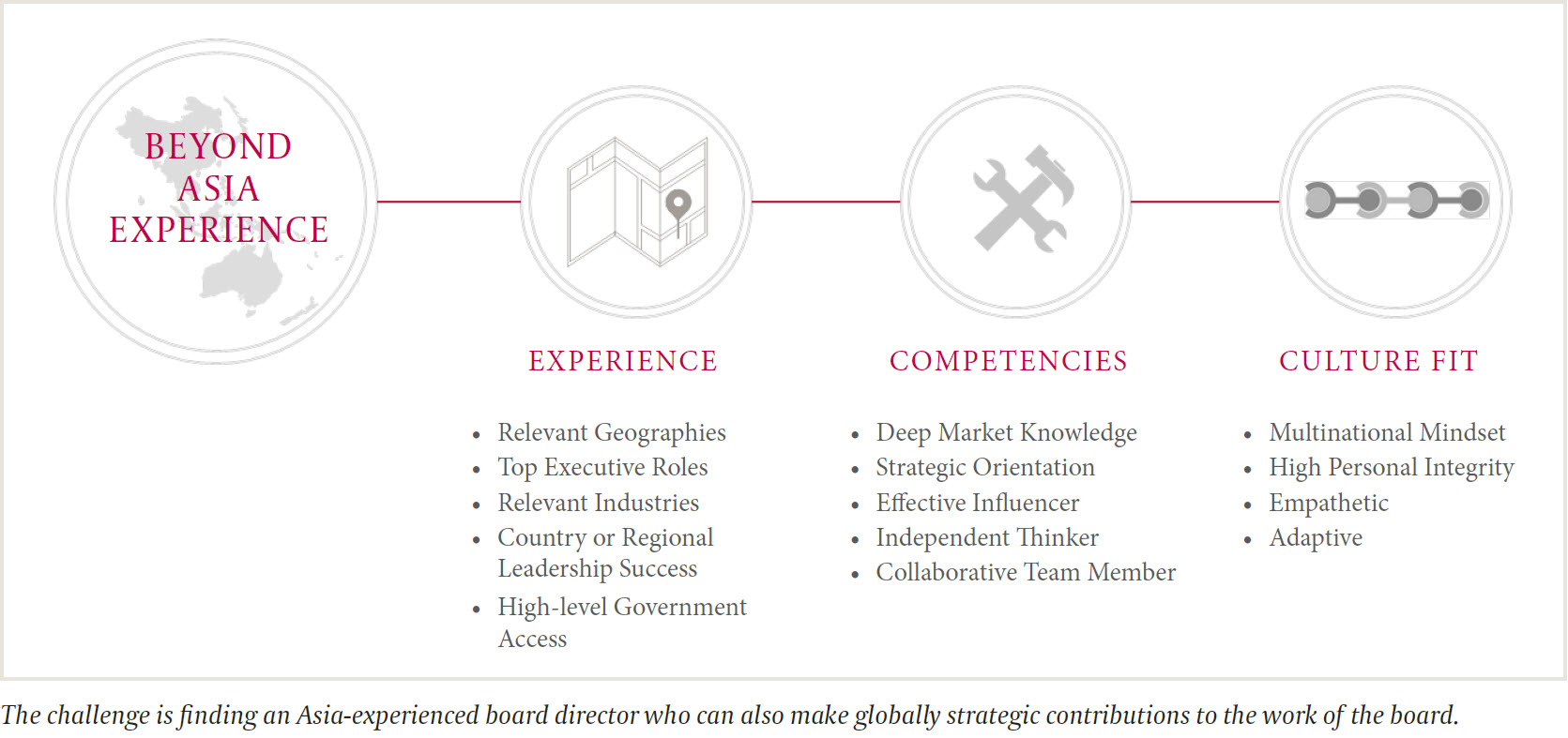Beyond Asia experience on your board
Asia has figured prominently in many western multinationals’ strategies. Recognizing this, many of our US and European client boards have sought board members who have deep experience working and leading in Asia. The desire for this experience makes perfect sense, but the most effective boards also recognize that factors beyond this Asia experience will determine whether a new director proves to be a successful addition to the board.
EXPERIENCE PLUS
Bringing the right Asia expertise to your board begins with clearly distinguishing short-term tactical needs – which may be better addressed by recruiting an operating executive, engaging an expert consultant, or creating an advisory board – from the long-term strategic contributions expected from any new board director.
You must also assess whether board candidates offering Asia expertise will enhance your board’s interpersonal dynamics and collective vision.
To provide one example, here are the topline criteria that guided our search for a director to join the board of a US- based multinational technology company:
- Is familiar with the electronics device ecosystem.
- Has served as a CEO or COO (or a very broad, business- oriented CFO) of a company as it grew from ≈ $1 billion to $5+ billion per annum in sales.
- Has high-level business experience in Asia and is known to Asian “movers and shakers.”
- Is a strategic thinker with the ability to influence others through open exchange of ideas.
- Is well respected by his/her peers as a person of both high intelligence and high integrity.
- Understands and supports Western governance standards and business values.
This board appropriately made deep Asia experience only one of six “must have” criteria, greatly increasing the chances that the search would surface candidates capable of working effectively with fellow board members to help the company succeed globally, not just in Asia.
The director the board subsequently recruited later shared these thoughts about what he has been able to contribute: “I have helped the CEO understand China, which is obviously an important market. I have also helped the company select the right leader for the operations in China and have coached that new leader as he rebuilt his own team there.” Yet this director does not view himself purely as a China specialist. “One-third of our business comes from the US, one-third from Europe, and one-third from the rest of the world,” he says. “Therefore the next CEO needs to be global, not just American. I have pressed the discussion for everyone to provide input on the definition of the characteristics of the next CEO, a definition the entire board can agree on.” These are the words of a constructively assertive global board director whose contributions are by no means limited to Asia expertise. This is the kind of director you want to add to your board.
STRATEGIC COMPETENCIES
The best boards specify a full range of strategic strengths when recruiting Asia-experienced directors, including:
Deep Market Knowledge. Many of the best qualified director candidates have been successful top executives in Asia. US technology company boards frequently favor general manager candidates who have led at the country or regional level and have access to local governments at high levels.
Strategic Orientation. A board obviously has great strategic responsibility, requiring directors who can effectively participate in deliberations and decisions that are game-changing. As such, the ideal director is strategic not just in the context of Asia, but in global terms.
Effective Influencer. Boards customarily want directors who participate actively in board deliberations while positively and constructively exercising influence.
Independent Thinker. Objective, independent thinking is the hallmark of a great board, and thus a fundamental responsibility of every director. The most effective boards seek directors with the confidence and courage to voice their perspectives.
Collaborative Team Member. Constructive collaboration is as important as independent thinking. For a board to be at its best, all members must share a clear sense of how to balance independent thinking with effective teamwork.

CULTURE FIT
In addition to deep Asia-experience and a full range of demonstrated strategic strengths, the best boards seek directors who will also be a good cultural fit. A poor cultural fit can undermine the competencies a new director brings to the board, particularly the power to constructively influence the board’s thinking and articulate independent thinking.
“I’ve worked with many Chinese executives. Some can be very assertive,” says the Chairman of a US technology company’s board. “But many are not as vocal or proactive as they need to be to fully participate on US company boards, where the exchanges can get quite lively. Of course, the culture fit differences cut both ways,” the Chairman notes. “I was invited to attend a couple of Chinese technology company board meetings to gauge my interest in joining their boards. To me, their proceedings felt scripted. There was less free-flowing exchange of views than I am accustomed to hearing in a boardroom. So I can understand how, stylistically, some Chinese nationals serving on US Boards might not feel entirely clear about how they should contribute. Culture fit differences can take you out of your comfort zone. Boards must be prepared to deal with that.”
Culture fit, then, can be as important as experience and competencies in determining whether an Asia- experienced board director will be a full strategic contributor to a board – particularly if all or most other board members are westerners. Indeed, for any multinational board to succeed, all of its members must recognize and appropriately transcend cultural barriers to find constructive common ground. Boards urgently seeking Asia insight are therefore wise not to compromise. Every director should exhibit a multinational mindset, high personal integrity, empathy, and adaptability.
BE OPEN AND PRAGMATIC
To find directors who can meet such expansive expectations, boards must keep an open mind. The best candidates may be found in unusual settings. The ideal Asia-experienced board director for a technology company’s board, for example, may have worked his or her way up through a major US corporation while garnering deep experience in Asia, then veered off the traditional corporate path to do something entrepreneurial, then transitioned into a quasi-governmental role, and can now be found running a science park, serving as dean of a university, or working in some other capacity that is out of the business mainstream yet carries significant stature and strong links to relevant communities in Asia.
Boards should also consider being more flexible about seniority. Executives leading Asia for a global company can be a level or two below a corporate CEO, and thus less senior than what the best boards typically seekin an outside director. But in practical terms, many such executives lead vast business territories with near autonomy and, much like a corporate CEO, regularly interact with top government officials, banks, and other senior stakeholders.
Ultimately, the most practical mindset a board can adopt when seeking to add Asia-experienced directors combines very high standards with a willingness to move outside the lines of the typical director profile. This path to adding Asia experience is neither the simplest nor the easiest, but it is clearly the most effective.






